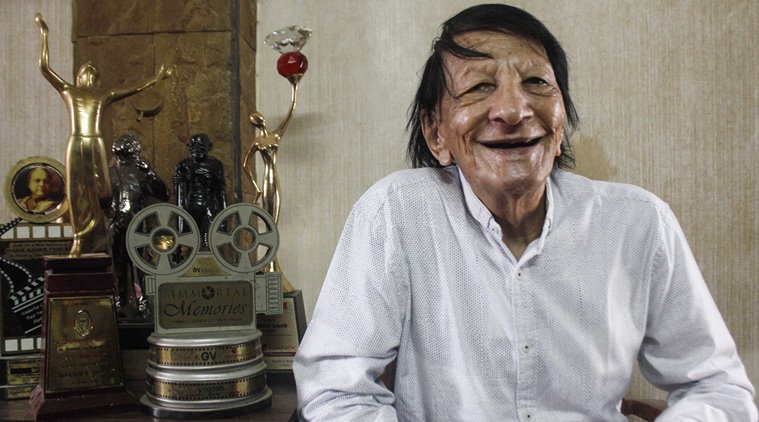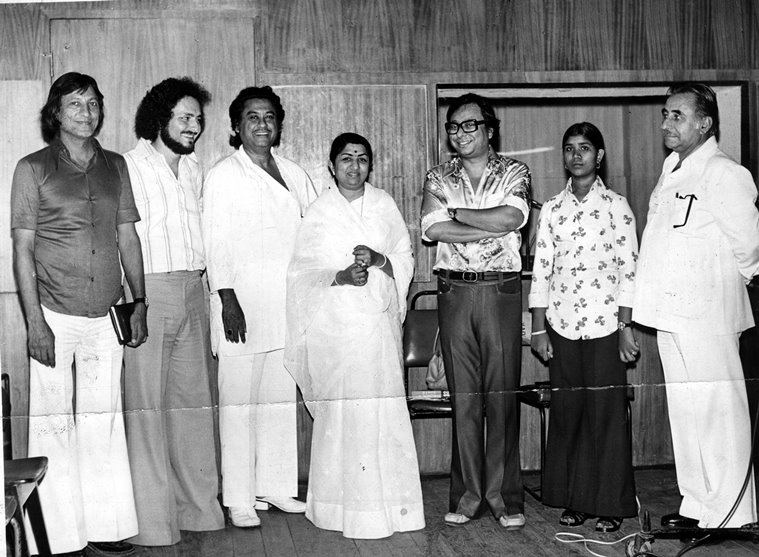
The Indian Express
Yogesh (1943-2020): Stories in a song
Veteran lyricist Yogesh, who penned many hits for films like Anand, Mili and Rajnigandha, passed away in Mumbai on Friday. He was 77
by Ektaa MalikLyricist Yogesh had a favourite incident, one that he would often recount to his acquaintances, of how Javed Akhtar would have what the millennials would call a ‘fanboy’ moment whenever they met. “Whenever Javed Saab would run into me, be it at award functions, or other gatherings, he would start humming songs written by me, especially the ones I wrote for Anand. It used to be very surreal,” revealed veteran lyricist Yogesh Gaur, who used only his first name, in an earlier conversation with The Indian Express. The veteran lyricist who has films such as Anand, Mili, Rajnigandha to his name, passed away on Friday in Mumbai. He was 77. The lyricist, who had been unwell for the past couple of years, is survived by his son and daughter-in-law.
Yogesh’s last outing as a lyricist was in the 2017 film Angrezi Mein Kehte Hain, for which he wrote three songs. It was his last film in a journey that began almost six decades ago when he came to Mumbai from Lucknow as a seventeen-year-old. He hoped to find work in filmmaking but he also harboured a love for poetry and verse from an early age, courtesy his mother. His chance meeting with Gulshan Bawra, the writer of songs like “Mere desh ki dharti” (Upkar), who lived in the same chawl as Yogesh, pushed him towards writing.
Yogesh burst on the scene in the early 60s, where he rubbed shoulders with the ilk of Indeevar and Gulzar. He got his first break, writing songs for the 1962 film Sakhi Robin for which he was paid Rs 25. The song “Tum jo aa jao”, sung by Manna De, went on to become a rage and was played in the prime time slot on Radio Ceylon. “That set the tone for me. I got simple, slice-of-life films. I always wrote the words to the set tune. I don’t think writers do that anymore,” Yogesh had said.

Yogesh made a name for himself for writing simple Hindi lyrics, in an industry which at that time was leaning heavily towards more flowery Urdu verse. He wrote about things he saw and experienced, the hustle and bustle of a beach, or the way a metropolis functions, the way the sun peeks between high rise buildings. He never harboured dreams to go and write in an idyllic, restful atmosphere of the hills. The energy of the city is what he thrived on. The Mumbai rains have had their anthem written by Yogesh, and till date we cannot erase the image of Amitabh Bachchan and Moushumi Chatterjee enjoying the rain slicked skyline of the city as they frolicked to the tune of “Rimjhim gire saawan”, in the film Manzil (1979). “I write about everyday things, the people around me. Unke beech mein hi rehkar, door jaaunga toh kaise likhunga,” Yogesh had remarked. Inspite of being self taught, Yogesh had developed an intense command on the metre and rhythm of lyrics. Elaborates writer and lyricist Varun Grover, “I learned a lot from his words. They had the magical ability to hit that sweet spot between simplicity and depth. In the song “Kahin door jab din dhal jaye”, a later stanza says: ‘Dil jaane mere saare bhed ye gehre’. The way this line in the song appears and settles, it’s like an exotic bird’s feather landing on a book and is the most inspiring. His sense of rhythm and meter were masterful, the track “Raaton ke saaye ghane” from Annadata is the perfect example of how effortlessly he cracked a very difficult tune.”
Towards the latter part of his career, he struggled to keep in step with the changing pace and the new publicity and marketing centric energy of the film industry. He kept to himself and spent most of his time in his small flat in Goregaon. The way Yogesh was forgotten is perhaps reflective of the ephemeral nature of popularity and success in the film industry. He passed away at his friend Satyendra’s home in Vasai Road. “Yogesh saab’s work was all around us, we all grew up on his songs, but the sad fact is very few people associated his works with his name. Probably because he was a simple man who lived away from the PR-driven madness that this industry has always been. This brutal city wilfully forgets or erases the names that don’t fit its narrow mould of what’s limelight-worthy,” says Grover. “There’s no other way to explain why the lyricist of legendary songs like “Kahin door jab”, “Zindagi kaisi hai paheli”, “Aaye tum yaad mujhe”, “Na jaane kyun”, and probably the most well-known Mumbai rains song “Rimjhim gire saawan” among others, lived a life of un-recognition and stayed mostly absent from our memories for a couple of decades now,” he says.